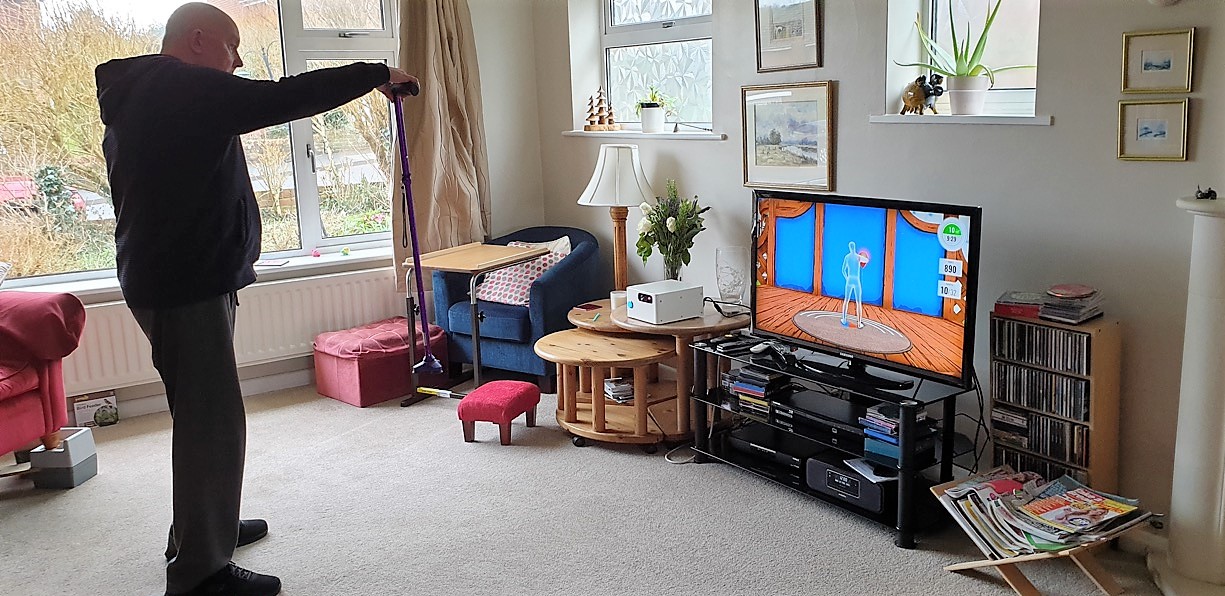Hobbs Rehabilitation, one of the UK’s leading independent providers of neurorehabilitation services, has begun to provide personalised virtual rehabilitation to chronic stroke patients in their home through the EvolvRehab platform. The project, funded by the UK’s National Institute of Health Research (NIHR), will study the usability of EvolvRehab as a means of providing in-home therapy for stroke survivors. Researchers from the University of Winchester are also involved in the 1-year study in order to measure the level of acceptance by the patients.
The initial feedback from the first two stroke survivors to begin using the newly launched Evolv RehabKit has been extremely positive, as they enthusiastically continue their 3-month program of prescribed exergames tailored to their individual needs. Hannah Woods-Hier, the therapist supervising the project for Hobbs, is in charge of personalising the exergames for each of the patients, as well as follow their adherence to treatment and performance results. The integration of Microsoft Teams into the EvolvRehab platform means that patients can maintain direct contact with their therapists with periodic video meetings. Hobbs are also using Teams to provide the patients with their weekly questionnaire that will beused in the study.
Hannah Woods-Hier, the therapist supervising the project for Hobbs, is in charge of prescribing the personalised exergames for each of the patients, as well as follow their adherence to treatment and performance results. When discussing the advantages of EvolvRehab for telerehabilitation, she said “It enables an engaging programme of exercises for patients that can be tailored by their therapist to their needs to be completed at home. I find that patients are more compliant with the programme as they are having fun while doing it and perhaps completing more exercise than they think as they are engaged in the games as opposed to the number of repetitions they are completing as in traditional home exercise programmes.” She explains how she follows her patients’ treatment plan through the Evolv Manager module “I can also monitor their progress remotely. This lets me know how the patient is adhering to the programme as well as the length of time each session takes and how many repeatitions they are completing. This lets me personalise their programme further to ensure they are working at the correct level and intensity, progressing them as needed.” Finally, she discussed what she sees as one of the important advantages of EvolvRehab “Patients are able to see how they are moving through the avatar on screen which provides prompts to them to monitor the quality of their movement rather than just achieving it which is always a difficult monitor through a traditional home exercise programme, this gives the patients’ greater awareness of their own movement patterns.”

Nicky Ellis, co-founder of Hobbs Rehabilitation, said of the project “We’ve been using the EvolvRehab solution at Hobbs for years now, and we’ve worked closely with the Evolv team to provide them with clinical feedback on their products. The NIHR Seedcorn project gave both of us an excellentopportunity to test their new RehabKit directly in patients’ homes. The project start was delayed because of the Covid lockdown here in the UK, and the pandemic has greatly reduced the possibility of patients to receive one-on-one or group therapy in clinics which makes this telerehabilitation project even more relevant. Now that we have EvolvRehab up and running with patients, we’re looking forward to seeing the results”.
Evolv will be providing updates of the project during the year it will be live. This project forms part of a series of international initiatives to roll out telerehabilitation to provide much needed care for patients who are being adversely affected by the Covid-19 crisis.